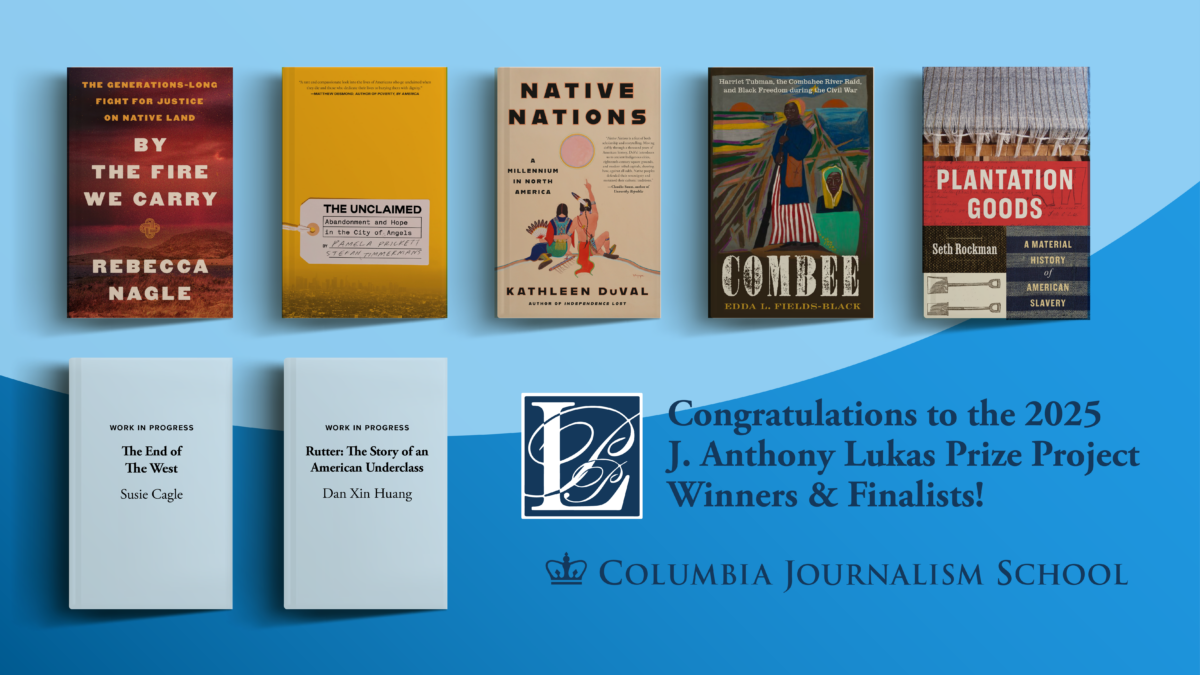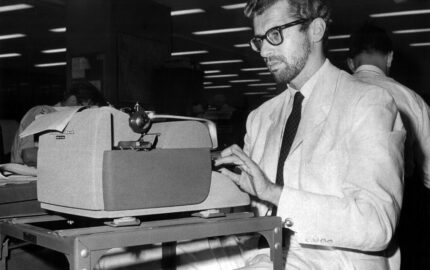Columbia Journalism School and the Nieman Foundation for Journalism at Harvard University are pleased to announce the four winners and three finalists of the 2025 J. Anthony Lukas Prize Project Awards. The Lukas Prizes, established in 1998 and consisting of the J. Anthony Lukas Work-in-Progress Awards, the J. Anthony Lukas Book Prize, and the Mark Lynton History Prize, honor the best in American nonfiction book writing.
The winners were chosen from 436 entries and selected by three teams of judges from across journalism, publishing, and academia.
Winners and Finalists of the 2025 Lukas Prizes
J. Anthony Lukas Work-in-Progress Award Winners
- Susie Cagle, The End of the West (Random House)
- Dan Xin Huang, Rutter: The Story of an American Underclass (Knopf)
J. Anthony Lukas Book Prize
- Winner: Rebecca Nagle, By the Fire We Carry: The Generations-Long Fight for Justice on Native Land (Harper)
- Finalist: Pamela Prickett and Stefan Timmermans, The Unclaimed: Abandonment and Hope in the City of Angels (Crown)
Mark Lynton History Prize
- Winner: Kathleen DuVal, Native Nations: A Millennium in North America (Random House)
- Finalist: Edda L. Fields-Black, COMBEE: Harriet Tubman, the Combahee River Raid, and Black Freedom During the Civil War (Oxford University Press)
- Finalist: Seth Rockman, Plantation Goods: A Material History of American Slavery (University of Chicago Press)
About the Prizes
Established in 1998, the Lukas Prize Project honors the best in American nonfiction book writing. Co-administered by the Columbia University Graduate School of Journalism and the Nieman Foundation for Journalism at Harvard, and sponsored by the family of the late Mark Lynton, a historian and senior executive at the firm Hunter Douglas in the Netherlands, the Lukas Prize Project presents four awards annually in three categories.
J. Anthony Lukas Work-in-Progress Awards (two $25,000 prizes):
The J. Anthony Lukas Work-in-Progress Awards are given annually to aid in the completion of significant works of nonfiction on American topics of political or social concern. These awards assist in closing the gap between the time and money an author has and the time and money that finishing a book requires. Judges: Erika Hayasaki (chair), Adrian Nicole LeBlanc, and Matt Weiland.
Winner: Susie Cagle, The End of the West (Random House)
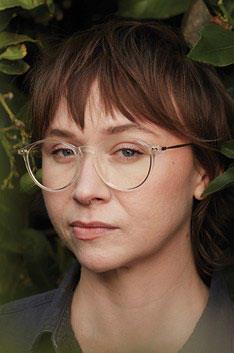
Susie Cagle is a journalist and illustrator in California. She was a reporter for The Guardian, ProPublica, and Grist. Her work has appeared in The New York Times, Wired, The Nation, and the MIT Technology Review, and has been honored with a Sigma Delta Chi Award and as a John B. Oakes Award finalist. She is a graduate of Columbia Journalism School.
The End of the West tells the story of California at the vanguard of colonialism, capitalism, and now climate change, through the stories of people and places intent on profound adaptation. Cagle spent years reporting from the farthest reaches of the state, from the removal of a dam on the winding and salmon-starved Klamath River at the state’s heavily forested northern edge, to the emerging DIY firefighting crews in the Santa Monica mountains. The End of the West is the culmination of that effort, a rich mosaic of archival research and field reporting, including interviews with more than 300 subjects, told in text and illustration.
Judges’ citation: The End of the West is a rigorously reported, gracefully written chronicle of the making and unmaking of Manifest Destiny: the development, colonization, and reinvention of the West, a story that at its core is a fundamental reckoning with the future of our country and world. In vivid and immersive prose, Susie Cagle carefully unspools her narrative through the intimate lens of a place grappling with its own survival and adaptation. Cagle is a confident and compassionate guide, rendering the region itself as a complex character. With cinematic prose she introduces us to its crevices and corners: from the largest dam-removal project in the history of the U.S. on the Klamath River, to the lithium fields on the toxic Salton Sea. Cagle skillfully weaves together an array of vignettes and interviews, creating a masterful mosaic. Her writing draws together intersections of history, science, and resilience in the face of climate disasters, colonialism, and capitalism. Along the way, she offers extractable insights on critical concerns that reach well beyond the region itself. This award will help her complete the last stages of her reporting, editing, and fact-checking for a book that is sure to become a remarkable achievement in scope and narrative craft reminiscent of the work of J. Anthony Lukas.
Winner: Dan Xin Huang, Rutter: The Story of an American Underclass (Knopf)
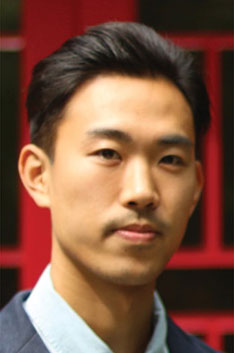
Dan Xin Huang is an independent writer and journalist with a focus on politics and global affairs whose work has appeared in Foreign Affairs, Foreign Policy, Guernica, The New Republic, New York Magazine, Pacific Standard, and The Village Voice, among others. He previously worked as a financial reporter at The Wall Street Journal.
In Rutter: The Story of an American Underclass, a thoroughly reported, polyphonic narrative, journalist Dan Xin Huang returns to his Appalachian hometown of Athens, Ohio, a community beset by segregation, to offer an exploration of class in America. He gives voice to people on all sides — across generations, political affinities, and socioeconomic strata — of a heated, historic school integration debate. From the same publisher as J. Anthony Lukas’s Common Ground: A Turbulent Decade in the Lives of Three American Families, Rutter depicts the realities of those living at the deep end of our increasingly unequal, rigged system.
Judges’ citation: Rutter: The Story of an American Underclass is an epic narrative centered in Athens, Ohio, where the author grew up, examining America’s fault lines through one Appalachian community and school district. Relying upon years of reporting and immersion, Huang asks readers to consider how do American taboos about class “drive our motivations and shade our interactions? And how do they steer — as both symptom and cause — our very conception of education?” Athens becomes a powerful microcosm for considering profound fractures within the rest of the country. Even as Huang is personally connected to this place, he chooses to be the mostly omniscient writer behind the scenes, as he weaves together compelling profile sketches — vivid vignettes moving along a propulsive narrative timeline. These ground-level details and reflections build toward incremental knowledge and surprise. In the spirit of the writing of J. Anthony Lukas, Huang’s authoritative prose is drawn from intimate interviewing, close observation, and thoughtful research — the kind of time-intensive reporting that this award will help support as he completes this book.
J. Anthony Lukas Book Prize ($10,000):
The J. Anthony Lukas Book Prize recognizes superb examples of book-length nonfiction writing that exemplify the literary grace, commitment to serious research, and original reporting that characterized the distinguished work of the award’s namesake, J. Anthony Lukas. Books must be on a topic of American political or social concern published between January 1 and December 31, 2024. Judges: Suzy Hansen (chair), Tyler Austin Harper, Héctor Tobar, and Krithika Varagur.
Winner: Rebecca Nagle, By the Fire We Carry: The Generations-Long Fight for Justice on Native Land (Harper)
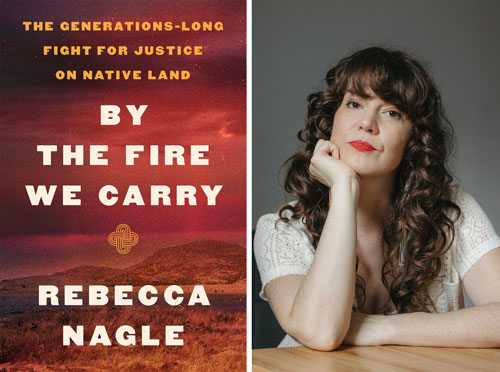
Rebecca Nagle is an award-winning reporter, writer, and citizen of Cherokee Nation. She is the creator and host of Crooked Media’s chart-topping podcast “This Land.” Her work has been featured in The Atlantic, The Washington Post, The Guardian, USA Today, Teen Vogue, and The Huffington Post, among other outlets. Nagle lives in Tahlequah, Oklahoma.
By the Fire We Carry: The Generations-Long Fight for Justice on Native Land recounts the struggle for tribal land and sovereignty in eastern Oklahoma. Rebecca Nagle braids together the story of the forced removal of Native Americans onto treaty lands in the nation’s earliest days with a small-town murder in the 1990s that led to a Supreme Court ruling reaffirming Native land rights more than a century later. Chronicling both the contemporary legal battle and historic acts of Indigenous resistance, By the Fire We Carry exposes both the wrongs that the U.S. government has committed and the Native-led battle for justice that has shaped our nation.
Judges’ citation: By the Fire We Carry is a deeply researched work of reportage, history, and memoir about the United States’ systematic destruction and disenfranchisement of its Native American population. Rebecca Nagle reminds us with startlingly original reporting and deft literary skill that this injustice is alive and well today, particularly in the realm of the law. Wading through endlessly thorny legal details and exposing the stunningly resilient prejudice toward her people — even or especially from some of our most lauded Supreme Court justices — Nagle’s story ends in a rare triumph for her community. And it is there that the brilliance of his book is most evident: Nagle knows that for the Native Americans, a triumph is still a tragedy. Only someone with her depth of knowledge, intensity of feeling, and gift for language could evoke this paradox with such beauty and such power.
Finalist: Pamela Prickett and Stefan Timmermans, The Unclaimed: Abandonment and Hope in the City of Angels (Crown)
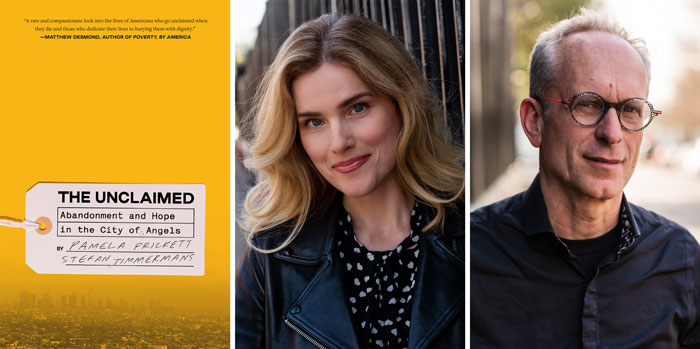
The Unclaimed: Abandonment and Hope in the City of Angels is an intimate and moving investigation of an underreported phenomenon — the rising number of unclaimed dead in America today. Each year, up to 150,000 Americans go unclaimed by their relatives after death, leaving local governments to dispose of their bodies. In this extraordinary work of narrative nonfiction, eight years in the making, sociologists Pamela Prickett and Stefan Timmermans uncover a hidden social world. They follow four individuals in Los Angeles, tracing the poignant, twisting paths that put each at risk of going unclaimed, and introducing us to the scene investigators, notification officers, and crematorium workers who care for them when no one else will. The Unclaimed forces us to confront social ills, from the fracturing of families and the loneliness of cities to the toll of rising inequality. But it is also filled with unexpected moments of tenderness that reaffirm our shared humanity. Beautifully crafted and profoundly empathetic, The Unclaimed urges us to expand our circle of caring — in death and in life.
Judges’ citation: The Unclaimed is an outstanding feat of journalism that sheds light on a drama kept hidden from the American public. With boundless empathy, and a powerful eye for detail, Pamela Prickett and Stefan Timmermans have crafted a series of intimate and compelling stories about the lives of ordinary people who die alone. These narratives transport the reader across decades and across the United States — but all end on the same lonely patch of grass and dirt on the Eastside of Los Angeles. The Unclaimed takes us where few books have gone before, diving deep into the bureaucracy that oversees the lives of the most isolated and vulnerable Americans, and that ultimately inters their remains. The reader marvels at the authors’ patient and deep reporting, and their ability to reveal the humanity of people who died largely forgotten, even by their own families. The Unclaimed offers a powerful warning about the social and emotional costs of the fraying of America’s social fabric.
Mark Lynton History Prize ($10,000):
The Mark Lynton History Prize is awarded to the book-length work of narrative history, on any subject, that best combines intellectual distinction with felicity of expression. Books must have been published between January 1 and December 31, 2024. Judges: Andrés Reséndez (chair), Keisha N. Blain, Scott Reynolds Nelson, and Elizabeth Taylor.
Winner: Kathleen DuVal, Native Nations: A Millennium in North America (Random House)
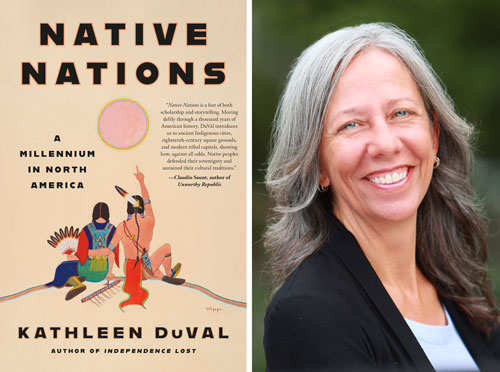
Kathleen DuVal is a professor of history at the University of North Carolina at Chapel Hill, teaching early American and American Indian history. Her previous work includes Independence Lost, a finalist for the George Washington Prize, and The Native Ground: Indians and Colonists in the Heart of the Continent. She is also a co-author of Give Me Liberty! and co-editor of Interpreting a Continent.
Native Nations: A Millennium in North America is “an essential American history” (The Wall Street Journal) that places the power of Native nations at its center. A millennium ago, North American cities rivaled urban centers around the world in size. Then, following climate change and instability, numerous smaller nations emerged, moving away from rather than toward urbanization. From this urban past, egalitarian government structures, diplomacy, and complex economies spread across North America. As historian Kathleen DuVal vividly recounts, when Europeans arrived, no civilization came to a halt because of a few wandering explorers, even when the strangers came well-armed. For centuries afterward, Indigenous people maintained an upper hand and used Europeans in pursuit of their own interests. Even as control of the continent shifted toward the United States through the 19th century, Native Nations shows how the sovereignty and influence of Native peoples remained a constant — and will continue far into the future.
Judges’ citation: This extraordinary work covers a thousand years of Native history to show how Indigenous peoples in North America forged dynamic and adaptable societies that flourished before, during, and long after the arrival of Europeans. Kathleen DuVal counters the narrative of rapid and inevitable Native decline with persuasive examples drawn from all over North America that go well beyond the few episodes of Native history taught at school to demonstrate Indigenous agency, vitality, humanity, and resourcefulness. Beginning with Native cities scattered along the Mississippi and the Southwest that rivaled those of early modern Europe, DuVal proceeds to tell a story of Native adaptation to formidable challenges such as climate change during the Little Ice Age, the arrival of Europeans, and above all the rise of the American nation. Native Nations offers no less than a new interpretation of Native history and explains why over 500 Native nations continue to exist within the boundaries of the present-day United States.
Finalist: Edda L. Fields-Black, COMBEE: Harriet Tubman, the Combahee River Raid, and Black Freedom During the Civil War (Oxford University Press)
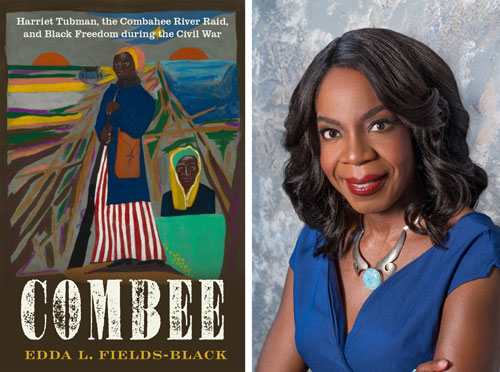
Edda L. Fields-Black is the author of Deep Roots: Rice Farmers in West Africa and the African Diaspora, as well as executive producer and librettist of “Unburied, Unmourned, Unmarked: Requiem for Rice” (with Emmy Award-winning composer John Wineglass). She lives with her family in Pittsburgh, where she teaches history at Carnegie Mellon University.
On the night of June 1, 1863, three federal gunboats steamed upriver from Beaufort, South Carolina, and destroyed seven plantations along the Combahee River, resulting in the liberation of more than 700 enslaved people. In COMBEE: Harriet Tubman, the Combahee River Raid and Black Freedom During the Civil War, Edda L. Fields-Black argues that the raid was the largest slave rebellion in the continental United States. Fields-Black offers a full account of this pivotal event and the central role that Tubman played in it. Drawing on meticulous and original research, she recreates the world of the rice plantations and that of the enslaved laborers (including Fields-Black’s third-great grandfather). Destructive as it was, the raid was equally an act of creation, contributing to the formation of the community that thrives to this day in the Gullah Geechee Corridor. COMBEE is the authoritative work on the raid, its historical actors, and its long aftermath.
Judges’ citation: In her brilliant and thoroughly researched study, Edda Fields-Black shines a light on an aspect of Harriet Tubman’s life that has not yet been explored in much depth: Tubman’s involvement in the Civil War. Drawing insights from previously unexamined sources, Fields-Black charts, in vivid detail, how Tubman effectively served the Union Army. With the sharp eye of a historian of West Africa and the African Diaspora, Fields-Black masterfully situates Tubman’s life and service within U.S. and transnational narratives. She draws on her extensive knowledge of West African rice farming in coastal Guinea, Georgia, and South Carolina to paint a vibrant portrait of how Tubman navigated the slave territory of Beaufort, South Carolina, and made sense of the world around her. Paying close attention to the intricacies of place and space, in COMBEE Fields-Black reveals how Tubman quickly learned the geography and culture of the Gullah Geechee community in South Carolina to gather intelligence for the army and to lead one of the most successful Civil War battles.
Finalist: Seth Rockman, Plantation Goods: A Material History of American Slavery (University of Chicago Press)
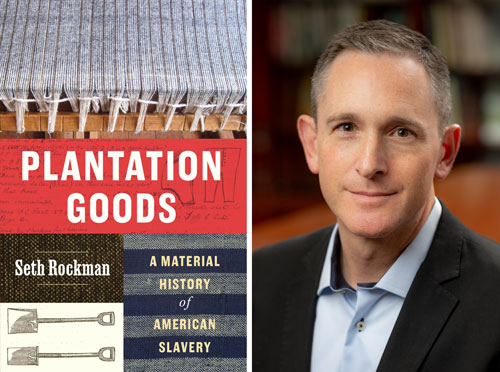
Seth Rockman is an associate professor of history at Brown University. He is the author of Scraping By: Wage Labor, Slavery, and Survival in Early Baltimore and the co-editor of Slavery’s Capitalism: A New History of American Economic Development.
Plantation Goods: A Material History of American Slavery is a rethinking of 19th-century American history that reveals the interdependence of the Northern industrial economy and Southern slave labor. In thinking of the industrializing North and the agricultural South, we overlook the economic ties that held the nation together before the Civil War. Using plantation goods — the shirts, hats, hoes, shovels, shoes, axes and whips made in the North for use in the South — historian Seth Rockman locates the biggest stories in American history in the everyday objects that stitched together the lives and livelihoods of Americans — white and Black, male and female, enslaved and free — across an expanding nation. By following the stories of material objects, Rockman reveals a national economy organized by slavery — a slavery that outsourced the production of its supplies to the North, and a North that outsourced its slavery to the South.
Judges’ citation: At the heart of Yankee ingenuity lay a fundamental secret that none dared name: slavery. As Seth Rockman brilliantly shows, New England’s mills, factories, mercantile houses, and packet ships relied on the “wealth produced by stolen labor.” Rockman’s astonishing detective work reveals how New England’s “men on the make” sent agents to Alabama, Kentucky, and Missouri to design and distribute the reliable plantation axes, cheap leather shoes, and durable “negro cloth” that would make American manufacturers famous around the world. These plantation goods became hidden parts of slavery’s infrastructure: Slaveholders demanded tools that would accelerate work, while the familiar “Georgia stripes” —fabric we now recognize as prison clothing — made enslaved people identifiable anywhere. Enslaved men and women nonetheless washed, dyed, mended, and transformed them, all inside the violent tinderbox of the plantation landscape.
For more than a century, the school has been preparing journalists in programs that stress academic rigor, ethics, journalistic inquiry, and professional practice. Founded with a gift from Joseph Pulitzer, the school opened its doors in 1912 and offers Master of Science, Master of Arts and Master of Science in Data Journalism degrees as well as a joint Master of Science degree in Computer Science and Journalism, and a Doctor of Philosophy in Communications. It houses the Columbia Journalism Review, the Brown Institute for Media Innovation, the Tow Center for Digital Journalism, and the Dart Center for Journalism and Trauma. The school also administers many of the leading journalism awards, including the Alfred I. duPont-Columbia University Awards, the Maria Moors Cabot Prizes, the John Chancellor Award, the John B. Oakes Award for Distinguished Environmental Journalism, the Dart Awards for Excellence in Coverage of Trauma, the Paul Tobenkin Memorial Award, and the Mike Berger Award.
The Nieman Foundation for Journalism at Harvard educates leaders in journalism, promotes innovation and elevates the standards of the profession. More than 1,700 journalists from 100 countries have been awarded Nieman Fellowships since 1938. The foundation also publishes Nieman Reports, a website and print magazine covering thought leadership in journalism; Nieman Journalism Lab, a website reporting on the future of news, innovation, and best practices
in the digital media age; and Nieman Storyboard, a website showcasing exceptional narrative journalism and nonfiction storytelling.
